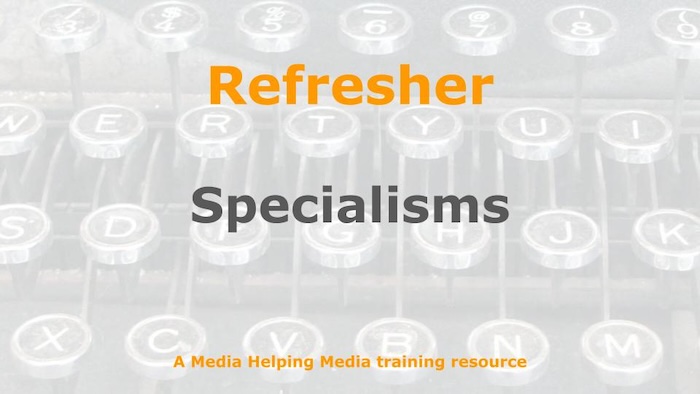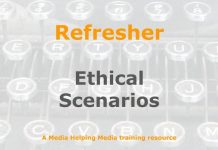 This day-long intensive training course on specialisms in journalism is designed to equip journalists with the knowledge to cultivate a specialist area of coverage, establish expertise, and report with depth and accuracy.
This day-long intensive training course on specialisms in journalism is designed to equip journalists with the knowledge to cultivate a specialist area of coverage, establish expertise, and report with depth and accuracy.
It’s based on the content from the six-week module ‘Specialisms in journalism’, which is free to download and adapt.
Over the course of the day, participants will learn the practicalities of identifying a sustainable niche, mastering complex subject matter, and establishing themselves as credible experts.
The training focuses on advanced techniques essential for specialist beats, including navigating powerful institutional landscapes (like Parliament and the courts), employing sophisticated interviewing strategies for political figures, understanding and avoiding manipulation, and maintaining rigorous ethical standards and editorial independence when covering sensitive topics like elections or conflict.
The programme is structured into four intensive sessions, balancing theoretical understanding with practical application through group activities, allowing journalists to leave with a refined concept for their chosen specialism and the confidence to report with unparalleled depth, accuracy, and independence.
We recommend that participants read the resources listed below before attending this refresher.
Session 1: Laying the foundation for specialisation (09:00 – 10:45)
- Focus: Identifying a specialist niche, understanding the advantages and challenges of specialisation, and cultivating diverse news sources.
- Exploring how specialisation allows journalists to offer more insightful and credible content.
- Identifying potential specialist areas based on interest, knowledge, and market demand.
- The importance of diverse, credible news sources and applying the ‘so what’ factor to ensure relevance.
- Group activities:
- Specialism brainstorming: Participants begin brainstorming their own potential specialisms and presenting the rationale to a small group.
- Source cultivation exercise: Groups identify and categorise five diverse news sources (official, academic, grassroots, etc.) for a hypothetical specialist beat and discuss how to verify their reliability.
- Recommended session resources:
10:45 – 11:00: Break
Session 2: Core beat reporting skills and complex institutions (11:00 – 12:45)
- Focus: Mastering reporting in highly structured environments (courts, parliament) and covering complex technical beats like climate change.
- Understanding the legal landscape, court etiquette, terminology, and reporting restrictions.
- Reporting crime accurately and sensitively, avoiding sensationalism and respecting victims.
- Covering climate change: Avoiding false balance, understanding scientific consensus, and linking local impacts to global issues.
- Demystifying parliamentary procedures and translating complex legislative processes into clear news stories.
- Group activities:
- Scenario analysis: Groups are given a scenario (e.g., a court ruling, a new parliamentary bill, or a scientific report) and tasked with drafting the first three paragraphs of a news story, ensuring accuracy and audience clarity.
- Ethics discussion: Discussing the need for independence while reporting on powerful political figures and institutions.
- Recommended session resources:
12:45 – 13:45: Lunch
Session 3: Mastering the interview and ethical practice (13:45 – 15:30)
- Focus: Advanced interviewing techniques, understanding interviewee motivations, and identifying and resisting manipulation.
- Thorough preparation, developing key questions, and anticipating responses for various interview formats.
- Specific strategies for interviewing political figures, asking tough questions, and handling evasive answers.
- Exploring motivations of interviewees (from publicity to whistleblowing) and how this influences the journalistic approach.
- Identifying common manipulation tactics used by various actors and strategies for countering them.
- Group activities:
- Role-playing exercise: Participants practice a challenging interview with a ‘politician’ or ‘evasive source,’ focusing on follow-up questions and maintaining control of the narrative.
- Case study analysis: Analysing real-world examples of media manipulation to identify the tactics used and how the journalists could have resisted them.
- Recommended session resources:
15:30 – 15:45: Break
Session 4: Advanced coverage, investigation, and strategy (15:45 – 17:30)
- Focus: Handling sensitive and traumatic coverage, ensuring electoral independence, and applying investigative depth to specialist reporting.
- Essential safety advice and ethical considerations for reporting from dangerous or traumatic situations.
- The paramount importance of maintaining impartiality and independence during election coverage.
- Tools and techniques for investigating potential election irregularities (data analysis, document scrutiny).
- Refining the specialist area concept and planning for ongoing professional development.
- Group activities:
- Investigative plan development: Groups develop a detailed plan for investigating a complex, sensitive story (e.g., potential electoral fraud or a major incident), focusing on source protection and data gathering.
- Specialist concept pitch: Participants present a refined concept for their chosen specialist area, outlining potential story ideas and a plan for building a portfolio.
- Recommended session resources:








